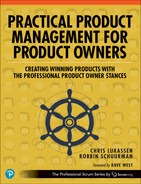22
Make Better Decisions: Thinking in Bets
Considering that a lot of our product management work takes place in the complex domain where there are more unknowns and uncertainties than knowns and certainties, chess doesn’t feel like a good metaphor for our situation. Instead, poker seems to be a more appropriate metaphor. In a game of poker, there are more cards hidden than revealed on the table. There are more cards in the deck than in your hand. In addition, players are unpredictable. They might place big bets without having a great hand of cards. They might also check or call despite having a great hand of cards. Above all, poker is a game of missing information. There are more unknowns than knowns. So, we need to make good guesses, try to read our opponents, and think in small bets.
Annie Duke is a former professional poker player and author in behavioral decision science. Apart from instructional books on poker, she wrote an interesting book, Thinking in Bets.1 This business-oriented book might help you to find ways to improve your decisions. It offers various practices to improve your decision-making process. Some of these ideas are very applicable for a Product Owner too.
1. Annie Duke, Thinking in Bets: Making Smarter Decisions When You Don’t Have All the Facts, Portfolio, 2018.
The Buddy System or Decision Pod
The buddy system or a decision pod is a commonly used practice among professional poker players, and it is usually very valuable among a group of Product Owners as well. It’s a gathering in which people inspect and evaluate decisions that they themselves did not make. The decision pod can be made up of people who work at the same company or of Product Owner friends you made at a training, meetup, or a previous employer, for example. It’s useful to include a Scrum Master, company leader, or people from adjacent domains in a decision pod.
Be careful with inviting only like-minded people. Discussing decisions with people who think like you do isn’t particularly useful if you want to obtain alternative ideas, opinions, and perspectives. This pitfall is commonly called the confirmation bias. Once an idea has settled in our brains, we start seeking evidence that supports that idea. Inviting like-minded people to a decision pod is bound to result in you cherry-picking data, perspectives, and opinions that back up your idea. Instead, invite people who are different from you. Also, be mindful of potential conflicts of interest. You may not want to evaluate decisions with people who are likely to use your openness, honesty, and transparency to stab you in the back.
When holding a decision pod with your buddies, someone should share a recent decision that they want to evaluate or a decision that they are about to make. The person sharing the decision is preferably open, honest, and transparent about all known information. It should be a safe space in which information is discussed openly but confidentially. In other words, what happens during the session stays in the session. When sharing a decision for evaluation, make sure to explain the decision process, people involved, the decision to be made, potential and foreseen outcomes, and so forth.
However, do not share the outcomes or results of the decision, ever. The results should never be shared in a decision pod because those outcomes might bias people toward a certain opinion. This bias is like the resulting pitfall, which you could have stepped into during our rolling-the-dice game. Focus only on the process, people involved, key decision information, and other relevant information. The outcome of a decision, though, is irrelevant during a decision pod.
Accepting Uncertainty in Decision Making
Like poker, product management could be considered as a game of incomplete information. There is a certain level of uncertainty, and we therefore need to test, experiment, verify, release, and learn. In this process, we can be open and transparent about what is known and what is unknown. Being open about what you know and don’t know provides boundaries for your reasoning. In addition, it might allow a buddy to point out opportunities and observations such as, “I notice you don’t have this and this information. Have you tried getting that from XYZ?”
Think of decisions like placing small bets in a game of poker. Acknowledge that two factors affect the success of your decisions as a Product Owner (as well as life decisions in general): the quality of your decisions and a good dose of luck. It’s okay to make some decisions that produce other outcomes than expected. We can’t be lucky all the time. However, it is important to learn from those bets that didn’t deliver the outcomes you hoped for, right?
Often, this means we must redefine “right” in our organizations. We need to identify and define what makes a decision a good one. Establishing a good process for decision making and delegating decisions to where the most relevant information resides are good practices. If we aren’t wrong just because things didn’t work out, then we aren’t right just because things turned out well.
